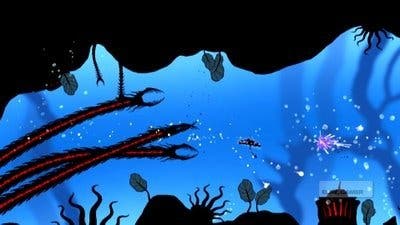Insanely Twisted Shadow Planet
Dark side of the Moon.
In this regard, while the game benefits from the Metroidvania template, it falls short of its inspirations in the details. There’s a lack of excitement every time you unlock a new weapon, derived from the fact it’s not always immediately clear what each one does.
Meanwhile, the puzzles, while often ingenious, are also fussy. For example, midway through the game you must painstakingly arrange a series of crystals to refract light towards a larger crystal in order to shatter it from your path. It’s a well-orchestrated conundrum that fails to give any jolt of relief or excitement when it’s solved, as you worked out how to complete the puzzle long before your thumbs managed to set the stage for the solution.
Another of the more frustrating vignettes has you firing a guided missile down a series of tight winding corridors to strike a lock at the far end. Bounce the rocket off the wall too many times and it’ll explode before it reaches its target, forcing a restart. There’s even that scourge of Zelda games, a water temple area, in which you must raise and lower the level of the liquid to fill lakes and trigger switches.
Outside of the main campaign, Lantern Run provides a multiplayer diversion. Up to four players see how far they can carry a series of lanterns before everyone is killed by enemies or all of the team’s lights are extinguished by the encroaching darkness. Your team’s score is measured in metres, and while each run starts out the same way, the map is dynamic, changing from attempt to attempt. It’s a strong addition to the package; well thought out and executed, it provides more thrills and excitement and most importantly, companionship than the single player campaign.
Back in the campaign, there’s nothing here to distract from the fact that this is a series of key and lock puzzles, with little else to upset that repetitive rhythm. It’s a game for players that appreciate a pure, mechanical approach to game making, for whom not only story but also character and theme are over-complications of the purity of video-gameness.

That’s fine. There is a unique sort of beauty to be found peeling back a metaphor to see the interlocking cogs of game design. But when you are being asked to invest in a world to the extent that you want to unlock its deepest secrets, you need that world to be mesmerising, issuing a siren call to your spirit to inspire all that effort. Moreover, those mechanics must click into place in a satisfying way, something that Shadow Planet never quite manages.
The joy of Shadow Complex, Super Metroid and Castlevania Symphony of the Night was just as much to do with the character of the place we were asked to reveal as the role we assumed to do it. We wanted to find out the secrets of these castles because they promised, in their conquering, we might uncover greater secrets and truths.
Neither Shadow Planets world nor your avatar within it inspire that level of interest. There is no metagame driving you forward here, other than the drive to explore for exploration’s sake. So what's left is the nucleus of a Metroidvania game, mechanically functional and regularly interesting, but a shadow of its inspiration nonetheless.








